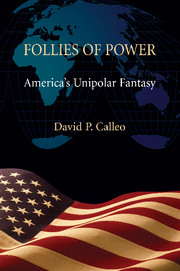Book contents
- Frontmatter
- Contents
- Acknowledgments
- Follies of Power
- PART I AMERICA'S GEOPOLITICAL ILLUSIONS AND THEIR CONSEQUENCES
- PART II THE NATURE AND LIMITS OF AMERICAN POWER
- 4 Assessing America's Soft and Hard Power
- 5 Feeding American Power: The Economic Base
- 6 Power and Legitimacy among Western States
- PART III WORLD ORDER IN THE NEW CENTURY
- Index
- References
5 - Feeding American Power: The Economic Base
Published online by Cambridge University Press: 05 June 2012
- Frontmatter
- Contents
- Acknowledgments
- Follies of Power
- PART I AMERICA'S GEOPOLITICAL ILLUSIONS AND THEIR CONSEQUENCES
- PART II THE NATURE AND LIMITS OF AMERICAN POWER
- 4 Assessing America's Soft and Hard Power
- 5 Feeding American Power: The Economic Base
- 6 Power and Legitimacy among Western States
- PART III WORLD ORDER IN THE NEW CENTURY
- Index
- References
Summary
Decline?
Throughout the Cold War, America's giant economy greatly reinforced its global power. A decade after the Cold War, the economy seemed stronger than ever. With the turn of the century, however, things began to go badly. By 2007, the U.S. appeared to have led the world into an economic crisis perhaps as severe as the Great Depression of the 1930s. The country's economic strengths, however, remain obvious. Its GDP is by far the largest for any single nation-state and is roughly equivalent to the collective GDP of all the European Union countries together. The U.S. is also the world's largest single importer and vies with Germany to be the largest exporter. America's foreign investments exceed anyone else's. The U.S. is also the largest single recipient of the rest of the world's foreign investment. The majority of the world's major corporations are American. The U.S. has unparalleled research facilities for developing and applying new technology. It also has an abundance of fine universities and attracts a large proportion of the world's best students and scholars.
The U.S. also has a special role in the international institutions that oversee global finance. The U.S. has, for example, been the dominant country in the International Monetary Fund (IMF) and an American invariably has headed the World Bank (IBRD). Since before World War II, America's dollar has been the world's principal currency for international transactions and monetary reserves, as well as for pricing oil and most other raw materials.
- Type
- Chapter
- Information
- Follies of PowerAmerica's Unipolar Fantasy, pp. 94 - 125Publisher: Cambridge University PressPrint publication year: 2009



